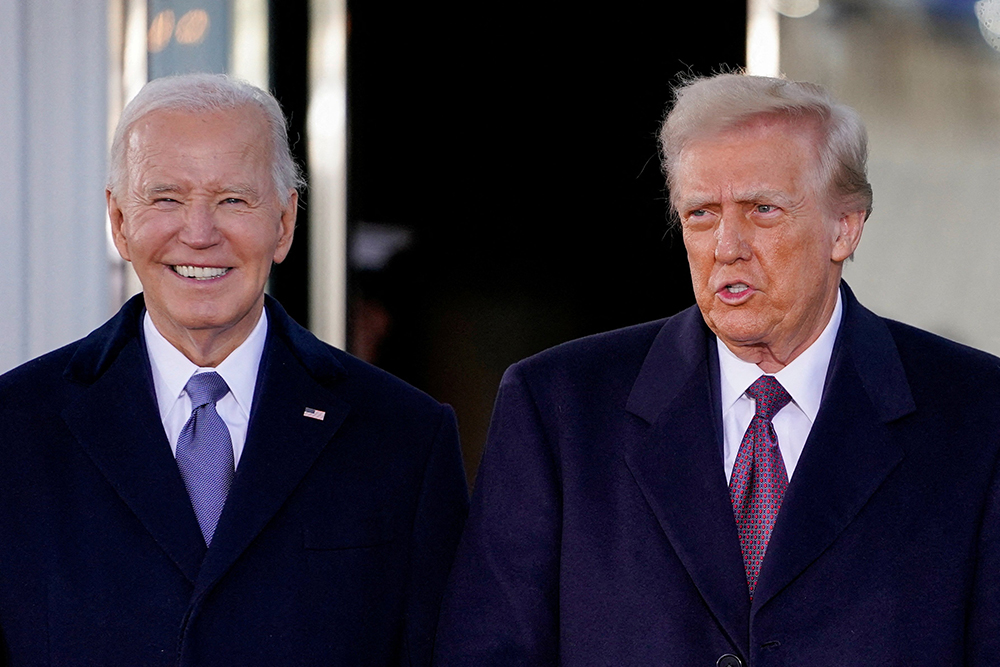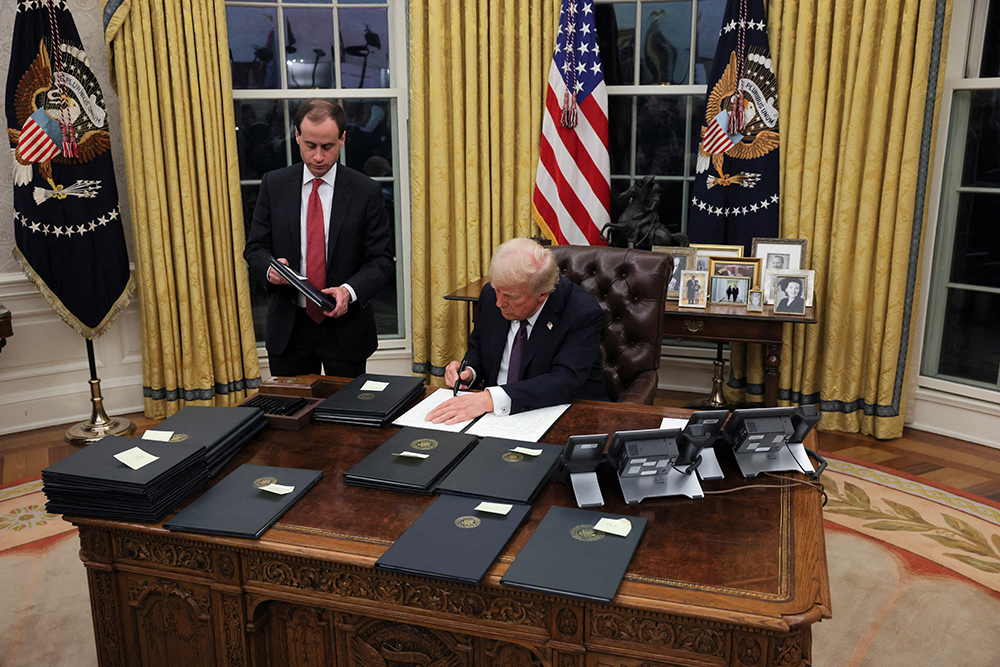
U.S. President Joe Biden poses with President-elect Donald Trump in Washington on Inauguration Day, Jan. 20, 2025, ahead of Trump's swearing-in as the nation's 47th president and the beginning of his second presidential term. (OSV News/Reuters/Nathan Howard)
In his final hours in office, President Joe Biden issued "preemptive pardons" to Gen. Mark Milley, Anthony Fauci and members of the House Select Committee that investigated the attack on the U.S. Capitol on Jan. 6, 2021. He also issued preemptive pardons to five family members.
That night, in his first hours back in the White House, President Donald Trump issued pardons to some 1,500 persons who had been convicted or were awaiting trial on charges related to that same attack on the U.S. Capitol. The pardons included those who had assaulted police officers during the attack.
The rule of law, without which no government can function, is at grave risk when pardons are issued in such indiscriminate ways. The very idea of preemptive pardons should be challenged in the courts, although I am not sure who would have legal standing to mount such a challenge.
Biden issued a statement justifying his preemptive pardons.
"I believe in the rule of law, and I am optimistic that the strength of our legal institutions will ultimately prevail over politics," he said. "But baseless and politically motivated investigations wreak havoc on the lives, safety and financial security of targeted individuals and their families. Even when individuals have done nothing wrong and will ultimately be exonerated, the mere fact of being investigated or prosecuted can irreparably damage their reputations and finances."
Advertisement
It is true that Trump's vindictiveness is a thing to be feared. Yes, he might have gone after the members of the House committee or members of Biden's family. They might have to incur legal bills to fight off the charges. But the government needs evidence of a crime to bring charges, and what would those charges be? Is it really plausible that a federal court would sustain an indictment against members of Congress for conducting an investigation? Or allow proceedings against Biden's family to proceed without any evidence of a crime?
Biden, the institutionalist, should have known better. He was quick to denounce the U.S. Supreme Court's decision articulating broad presidential immunity, saying it "undermines the rule of law." Do not preemptive pardons have the same effect?
No one wants to see their loved ones pay an unjust price because a bully has the power to make their lives hell. But the men and women of the armed forces put their lives on the line to defend the institutions of American democracy. Is it too much to expect Liz Cheney and the Biden family to pay some legal expenses to do the same?
The president's power to issue pardons is enshrined in the U.S. Constitution. Article II, Section 2 states that the president "shall have Power to grant Reprieves and Pardons for Offences against the United States, except in Cases of Impeachment." The Constitution sets no limits on this presidential power, but political power should exist within an ethic of justice. Granting pardons preemptively preempts the judicial system and, just so, undermines it.
Granting pardons preemptively preempts the judicial system and, just so, undermines it.
"Pardons can no longer be thought of as free gifts; nor are pardons discretionary," writes Kathleen Dean Moore in her book Pardons: Justice, Mercy & the Public Interest. "Granting a pardon is a duty of justice that follows from the principle that punishment should not exceed what is deserved. … Pardons should only be granted after sentencing, and pardons should not be valid until they are accepted by the person being pardoned."
One can sympathize with Biden. In normal times, his action would not have even occurred to him. But we are not in normal times. All of us, but people in positions of authority especially, must rise to the occasion and defend our democracy and its institutions. Perhaps Trump would have granted similar pardons to his family in four years, no matter what Biden did. Still, the fact that Biden pardoned his family first makes it that much harder to stigmatize any similar, future action by Trump. If Biden is allowed to protect his family while walking out the door, Trump is too.
Trump's decision to pardon the people who attacked the U.S. Capitol leaves a bad taste in the mouth of all those Republicans for whom their commitment to law and order as a partisan marker goes back at least to Richard Nixon. Those pardoned did not only attack the Capitol; they attacked the democracy which the Capitol symbolizes. Who is next? Maybe Trump could offer a posthumous pardon to Jefferson Davis.

U.S. President Donald Trump signs documents in the Oval Office at the White House on Inauguration Day in Washington Jan. 20, 2025. (OSV News/Reuters/Carlos Barria)
Ross Ulbricht, the founder of Silk Road, was also pardoned by Trump. Ulbricht was serving a life sentence for peddling drugs on the Silk Road site, which was part of the "dark web," but he was also a darling of libertarian groups and crypto investors. I wonder what evangelical Christians think of that pardon? Do they know about it? Will Democrats take out ads on radio in the red states to make sure people there do know about it?
In the next few years, we all will face more outrages of the type perpetrated by Trump and, therefore, conundrums similar to Biden's. No one should do anything to undermine what remains of our constitutional fabric. No one. Some may pay a price, and it will be unfair that they do.
We expected Trump to undermine our constitutional democracy on his first day in office. I was surprised and saddened to see Biden do the same on his final day in office. For the rest of us, we need to put our commitment to the rule of law ahead of our partisan loyalties and defend the Constitution from all who undermine its letter and its spirit.







